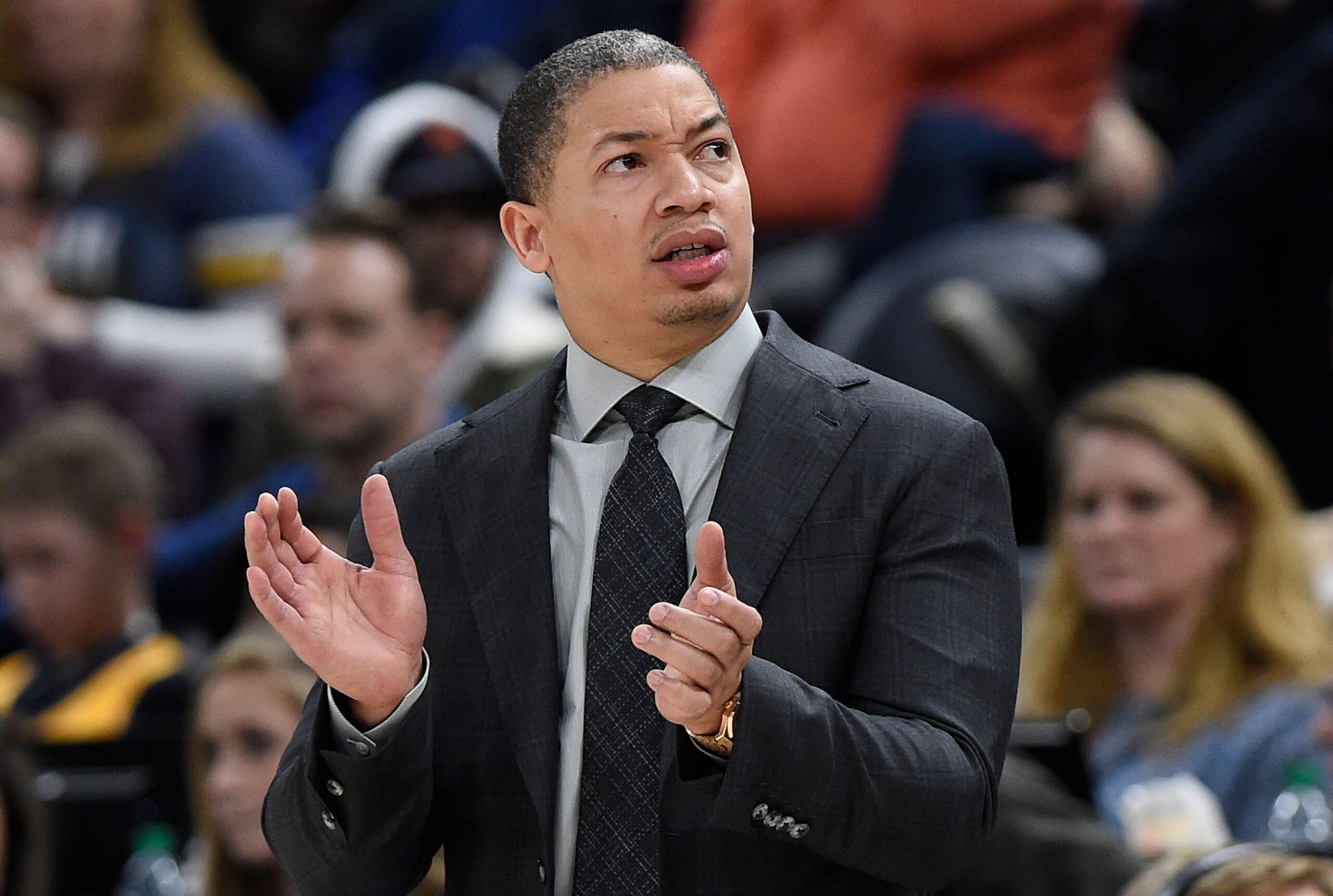Chris Ryan: On Tuesday ESPN, Cleveland.com, and The Athletic released stories suggesting that the Cavaliers’ mythical switch—the one they flip right around the postseason when they start playing defense—might be actually, really, no-we’re-being-serious-this-time broken. ESPN’s Dave McMenamin, citing multiple, anonymous “prominent” players, wrote about a sense of “doubt that the problems—an aging roster, defensively challenged personnel and a glut of redundant role players—could simply be worked out through patience and a chance to coalesce when fully healthy.”
We’ll get to the anonymous prominent players. First, let’s talk about the switch. Do you think it’s broken?
Justin Verrier: The streak they went on right before this current malaise—winning 13 straight and 18 out of 19 from mid-November until mid-December—I think shows they still have a top end in them. Or, at least, that having LeBron, even at age 33, is still enough for short bursts of success (like, say, during a playoff series, in which there are sometimes multiple rest days in between games).
I think the bigger issue is the same one they went into the summer facing: Can they beat the Warriors? And not only is the answer still no, the defense—the team’s most glaring concern last year—has become even worse.
You’ve always been a flip-switch believer, right?
Ryan: I was up until the third quarter of Monday’s game against the Warriors. That was when I realized that they can’t play two of their best three players against their biggest rival. I love Isaiah Thomas’s game and I’m really pulling for him, but you can’t hide him and Kevin Love on defense. Forget the Warriors—I don’t know if they can beat the Raptors or Celtics.
Verrier: Love has always been the toughest Tetris piece to build around. The Cavs might be at their best—especially against the Warriors’ Lineup of Death—with LeBron at the 5.
The Paul George–for-Love deal that never happened over the summer would make a lot of sense if the Cavs are willing to do a hard reboot should LeBron walk this summer. (Love probably isn’t the best fit for OKC, but at least the Thunder would have an asset under contract for longer.)
Ryan: And there’s the rub. LeBron’s future looms over this season, and it’s quickly moving from the background to the foreground as the trade deadline approaches. There are two paths: reinforcing the team right now or planning for a LeBron-less future.
Verrier: Yup. And the interesting subplot to it all is the Surrogate Nets. They’re currently the seventh-worst team in the NBA. ESPN projects them to finish tied for seventh-worst by the end of the season (though that mathematical outlook doesn’t include the return of their best player, D’Angelo Russell). I might be more willing to deal that Nets pick than before, simply because its value might get worse, not better, as the season continues.
It sure seems like the Cavs players want the front office to flip it.
Ryan: Let’s talk about those “Cavs players.” Is it at all conceivable that this is not LeBron? Is Kevin Love the personnel chessmaster leaking stories to the press?
Verrier: This guy has layers.
Ryan: Here’s the doomsday scenario:
Under LeBron pressure, the Cavs include the Brooklyn pick—which, even though it’s depreciating, is the first good pick they will have had since they took Wiggins and traded him for Turtleneck up there—in a deal that sends Tristan Thompson to Los Angeles for DeAndre Jordan. We’ve heard this rumored over the last couple of days. Their defense gets better, which ... it certainly can’t get worse. They make the playoffs, make a run to the Eastern Conference finals, hell, maybe even to the Finals. But they lose. And lose badly. And LeBron leaves, and DeAndre leaves (he can opt out after this season), and Isaiah leaves, and they are left with Love and their own late-first-round pick
That’s catastrophic. But you think DeAndre is worth the risk, right?
Verrier: This got dark.
Ryan: It’s dark!
Verrier: I think DeAndre might be worth it, simply because none of us thought the Cavs would beat a team coming off the greatest regular season in history. I think the best you can do—in most seasons, but especially in this one—is give yourself the best chance. And I think I’d rather take a big swing with LeBron (especially given the individual numbers he’s putting up this season) than clutch pearls and plan for a soft landing.
Ryan: Yeah, and this is where the long-term negotiation of LeBron’s future comes into play. It’s fine if he doesn’t want to commit to staying; that’s his prerogative. The Cavs don’t have to go all in on the present either.
The question becomes: Is there any move or moves the Cavs could make, now, to make them realistically competitive with the Warriors in June? (Note: You cannot trade Jose Calderon for Chip Engelland to come and fix Jae Crowder’s shot.) And I mean any move. I mean, firing Ty Lue and hiring David Fizdale; I mean trading Love for Marc Gasol (this might not be an upgrade, by the way); I mean anything.
Verrier: I think Paul George makes a lot of sense, but I don’t know if OKC is at that point yet. (Related: I think George for Blake Griffin would also be good for both sides.)
But to your point, it would have to be a deal that moves the needle. The Brooklyn pick is a big deal because Cleveland’s second-best asset (non-LeBron-or-Love division) is ... Tristan Thompson, a lunch-pail center with $36 million left on his deal after this year. The Cavs’ books are gross. That’s the tax for having LeBron. (Which Gilbert pays for with a casino next door to the Q that is probably getting more business because of LeBron, so NBD.)
Ryan: If a trade is not the answer—or the cure—then is there something they can do, tactically, to change their fortune? Joe Vardon had a piece on Cleveland.com this week breaking down all the team’s various maladies, and the one that jumped out at me (and it’s been brought up on /r/NBA) is this: The Cavs don’t practice. That’s courtesy of Isaiah, who was apparently talking about the challenges of playing himself back into shape with limited practice run. Once the season begins, NBA teams are notoriously short on time, but are we talking about a deeper institutional rot if the team can’t make time to get players in shape and up to date on strategy?
San Antonio has a system it runs its talent through, and it routinely turns coal into diamonds. Boston can make almost anyone a useful NBA player, whether they’re a high draft pick or Daniel Theis. Golden State obviously has two of the best five players on the planet, but it also has a way of playing that brings out the best in everyone from Zaza Pachulia to Nick Young. What is the Cleveland Way? What is the Cavs style? Name one guy, outside of Matthew Dellavedova, that they’ve developed.
Cleveland has had a revolving door of coaches and general managers, with the only real power resting with Gilbert and LeBron. Isn’t this season more an indictment of that setup than it is Isaiah Thomas not being good at defense (which we all could have told them last year)?
Vardon’s piece also included this chestnut:
“Rotations are awful. IT [Isaiah Thomas] is so much worse than Kyrie [Irving] defensively it’s insane,” said a league source. “There is not a great feeling anywhere. They need to limp into the All-Star break and get away from each other.”
This is bleak.
Verrier: The whole thing makes you think of Kyrie’s veiled comments about the dysfunction within the Cavs’ organization. It’s tough to say anything bad about LeBron, especially because of what a strong voice he’s become on social issues. But in what other business is it cool for an employee to challenge coworkers via subtweet? It’s like he’s thrown so much shade over the years that he doesn’t even bother to cover up the evidence anymore. (The “several prominent” players the three Cavs beat writers cite aren’t named, but their message and the means are very familiar.)
The organization—from the moves the front office makes to who and how they play—runs through LeBron. On the one hand, I support any player wrestling power away from Rich White Men. LeBron is the franchise and the money-driver, and as such, he should have a huge voice in all of this. On the other hand, when is that approach ever beneficial on the court? The one thing we know about basketball is that well-run organizations operate from the top down. Tim Duncan checked his ego, and everyone fell in line. The Warriors listened to a lower-level employee, started Andre Iguodala in the Finals, and won a title.
Having everything flow through LeBron can get you very, very far. But how is he simultaneously going to complain about not having help when he built this entire Cavs worldview?

Maybe the Cavs can make some subtle tweaks to how they play. Lue is not a master tactician, so they could always make another coaching change. But the Cavs’ asset chest was worn down to the nubs to build what they have now. And LeBron’s reluctance to give definitive answers about his future is forcing the front office to “well actually” any outcries to provide him any more immediate help.
LeBron can be a great player, great teammate, and great person, and also a detrimental force, because his agenda only aligns with his franchise’s for as long as it can provide him the necessary means to compete for a title. Kyrie has become the canary in the coal mine for CEO LeBron.
Ryan: Yeah. If I’ve learned anything this season, it’s that Kyrie is right about everything.
Verrier: Truly the voice of reason.

